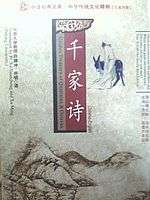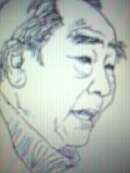Xu Yuanchong
| Xu Yuanchong | |
|---|---|
|
Xu Yuanchong | |
| Native name | 许渊冲 |
| Born |
April 18, 1921 Nanchang, Jiangxi |
| Occupation | Translator, professor, scholar |
| Language | Chinese, English, French |
| Nationality | Chinese |
| Alma mater |
National Southwestern Associated University University of Paris |
| Period | 1948 - present |
| Genre | Novel, poetry |
| Notable works | The Red and the Black |
| Spouse | Zhao Jun |
| Children | Xu Ming |
Xu Yuanchong (simplified Chinese: 许渊冲; traditional Chinese: 許淵冲; pinyin: Xǔ Yuānchōng; born April 18, 1921 in Jiangxi, China) is a translator of Chinese ancient poets[1] into English and French.[2] Xu took foreign language studies at Tsinghua University after he studied abroad. And after that, he became a professor in English and French. Since 1983 to now, he is professor at Peking University
Early career

Xu Yuanchong was born in Nanchang, Jiangxi Province. His mother, who was well educated and good at painting, had great impact on Xu in his pursuit of beauty and literature. His uncle Xiong Shiyi[3] was a translator, who translated the play "Wang Baochuan" into English, which was a hit in the UK and Xiong was invited by the British dramatist George Bernard Shaw. Xiong's achievement gave Xu a strong interest in learning English. When studying at the Provincial Nanchang No.2 High School, the best local school, his English had been outstanding. And in 1938 with excellent grades, Xu was admitted to the Department of Foreign Languages, National Southwest Associated University. In 1939, as a freshman, he translated his first work, Lin Huiyin's poem "Do not throw away" into English, which was published in the "Literary Translation News".
Style
His translation style is characterized by favouring domesticating translation.[4] Xu introduced the Creation for Loss[5] and the three beauties-concept to translation theory: the idea that a translation should be as beautiful as the original in three ways:[6][7]
- semantically (the -deeper- meaning)
- phonologically (the style like rhyme and rhythm)
- logically (amongst others: length)
According to Gao, "he advocates that the versions of poems should combine visual and aural beauties together, and they should reproduce the fusion of pictorial composition and musical arrangement."[8]
Achievements
His 30 Poetries were selected as teaching materials by foreign universities. After reading his English translation "Selected Poems of Li Bai" (1987), Qian Zhongshu said: If you live in the same age with Li Bai, you'll become good friends. The British Press,[9] "Romance of The Western Bower", which is thought as great as "Romeo and Juliet" in terms of artistic and attractiveness. British publishing company Penguin has published Xu Yuanchong's "300 China's immortal poems" (1994), which is launched in Britain, USA, Canada, Australia and other countries. That's the first time that the publishing company publishes a Chinese translation. Apart from translating the classical Chinese poetry into foreign languages, Xu Yuanchong also translated many of the British and French classics into Chinese. In his seventies, he was still involved in translating Proust's masterpiece, "Remembrance of Things Past" (1990) and translated Flaubert's "Madame Bovary" (1992), Stendhal's "Red" (1993). At the age of 78 years, Xu also published a voluminous long masterpiece, the translation of Romain Rolland's "John Kristof" (1999). Xu was awarded the "Lifetime achievements in translation" from the Translators Association of China (TAC) in 2010.[10] On August 2, 2014, at the 20th WorldConference of the Federation of International Translators (FIT),), FIT conferred The"Aurora Borealis" Prize on Xu Yuanchong, who is the first Chinese winner of the award.[11]
Works
- My Most Beloved: Tang & Song Verses
- Selected Poems and Pictures of Song Dynasty
- Laws Divine and Human and Pictures of Deities[12]
- Gems of Classical Chinese Poetry
- Romance of The Western Bower[13]
- Classic of Poetry (《诗经》)[14]
- Chu Ci (Qu Yuan) (《楚辞》)
- Tao Te Ching (Laozi) (《道德经》)[15]
- Analects (Kongzi) (《论语》)[16]
- The Story of the Western Wing (Wang Shifu) (《西厢记》)[17]
- The Peony Pavilion (Tang Xianzu) (《牡丹亭》)[18]
- The Palace of Eternal Life (Hong Sheng) (《长生殿》)[19]
- The Peach Blossom Fan (Kong Shangren) (《桃花扇》)[20]
- Poetry of Li Bai (Li Bai) (《李白诗选》)[21]
- Three Hundred Tang Poems (Sun Zhu) (《唐诗三百首》)[22]
- One Hundred Song Poems (《宋词一百首》)[23]
- Poetry of Mao Zedong (Mao Zedong) (毛泽东诗词集)[24]
- The Red and the Black (Stendhal) (《红与黑》)[25]
- Jean-Christophe (Romain Rolland) (《约翰·克里斯托夫》)[26]
- Madame Bovary (Gustave Flaubert) (《包法利夫人》)[27]
- In Search of Lost Time (Marcel Proust) (《追忆逝水年华》)[28]
Awards
- Chinese Translation Association - Competent Translator (2004)
- Chinese translation Culture Lifetime Achievement Award (2010)
Personal life
Xu married Zhao Jun (照君) in 1959 in Beijing, they have a son, Xu Ming (许明), also a translator.
References
- ↑ Zhang Zhi-zhong (2005). "A Close Study on the Revision of Poetry Translation by Prof. Xu Yuanchong". Journal of Southwest Jiaotong University (Social Sciences) (4). Retrieved 21 December 2011. abstract
- ↑ "Xu Yuanchong". China Book International. Retrieved 18 September 2011.
- ↑ http://en.cnki.com.cn/Article_en/CJFDTOTAL-AKSZ200201013.htm
- ↑ Wenfen Yang. "Brief Study on Domestication and Foreignization in Translation". Journal of Language Teaching and Research. 1 (1): 77. doi:10.4304/jltr.1.1.77-80. Retrieved 18 September 2011.
- ↑ Wang Feng-xia (2008). "The Representation of Cultural Genes in Poetry Translation—A Case Study of Excursion on Eastern Fields Cheerless by Xu Yuanchong". Journal of Xihua University(Philosophy & Social Sciences (2). Retrieved 21 December 2011. (abstract)
- ↑ Chan Sin-wai (2009). A Chrolonology of Translation in CHINA and in the WEST from the legendary period to 2004. Hong Kong: The Chinese University Press. p. 216.
- ↑ Dai Kai-hong (2006). "Translation of Poetry Approached by the Principle of"Beauty"—A Review of X.Y.Z.'s Translation of Grief beyond Belief". Journal of Huaihai Institute of Technology (Social Sciences Edition). abstract
- ↑ Lei Gao (January 2010). "On English Translation of Classical Chinese Poetry: A Perspective from Skopos Theory". Journal of Language Teaching and Research. 1 (1): 84–89. doi:10.4304/jltr.1.1.84-89.
- ↑ name of the website
- ↑ Chen Meng (translation) (20 May 2010). "Lifetime Achievement in Translation". EveryChina.com. Retrieved 21 December 2011.
- ↑ Liu Wenjia (5 August 2014). "The first Chinese winner of 'Aurora Borealis' Prize: Translation changes the world". english.peopledaily.com.cn/. Retrieved 17 August 2014.
- ↑ https://books.google.com/books?id=0B-cO8ZzE0UC&hl=zh-CN
- ↑ http://www.abc-chinese.com/b00clarw.html
- ↑ 《诗经》 (in Chinese). Beijing: 中国对外翻译出版社. 2009-09-01. ISBN 9787500120209.
- ↑ 老子 (2007-01-01). 《道德经》 (in Chinese). Beijing: 中国对外翻译出版社. ISBN 9787500112006.
- ↑ 孔子 (2005-12-01). 《论语》 (in Chinese). Beijing: 高等教育出版社. ISBN 9787040186116.
- ↑ 王实甫 (2009-09-01). 《西厢记》 (in Chinese). Beijing: 中国对外翻译出版社. ISBN 9787500122678.
- ↑ 汤显祖 (2009-09-01). 《牡丹亭》 (in Chinese). Beijing: 中国对外翻译出版社. ISBN 9787500122685.
- ↑ 洪升 (2009-09-01). 《长生殿》 (in Chinese). Beijing: 中国对外翻译出版社. ISBN 9787500122890.
- ↑ 孔尚任 (2009-09-01). 《桃花扇》 (in Chinese). Beijing: 中国对外翻译出版社. ISBN 9787500122692.
- ↑ 李白 (2008-11-01). 《李白诗选》 (in Chinese). Changsha: 湖南人民出版社. ISBN 9787543850019.
- ↑ 许渊冲 (2012-01-01). 《唐诗三百首》 (in Chinese). Beijing: 五洲传播出版社. ISBN 9787508521916.
- ↑ 许渊冲 (2007-12-01). 《宋词一百首》 (in Chinese). Beijing: 中国对外翻译出版社公司. ISBN 9787500118114.
- ↑ 毛泽东 (2006-01-01). 《毛泽东诗词集》 (in Chinese). Beijing: 五洲传播出版社. ISBN 9787508508474.
- ↑ 司汤达 (2012-06-01). 《红与黑》 (in Chinese). Beijing: 译林出版社. ISBN 9787544727761.
- ↑ 罗曼·罗兰 (2010-12-01). 《约翰·克里斯托夫》 (in Chinese). Beijing: 中央编译出版社. ISBN 9787511706867.
- ↑ 福楼拜 (2011-08-01). 《包法利夫人》 (in Chinese). Beijing: 译林出版社. ISBN 9787544722360.
- ↑ 乔伊斯·普鲁斯特 (2011-03-01). 《逝水年华》 (in Chinese). Beijing: 外语教学与研究出版社. ISBN 9787513506106.
External links
- Television show about Xu, CCTV-10 (in Chinese)
